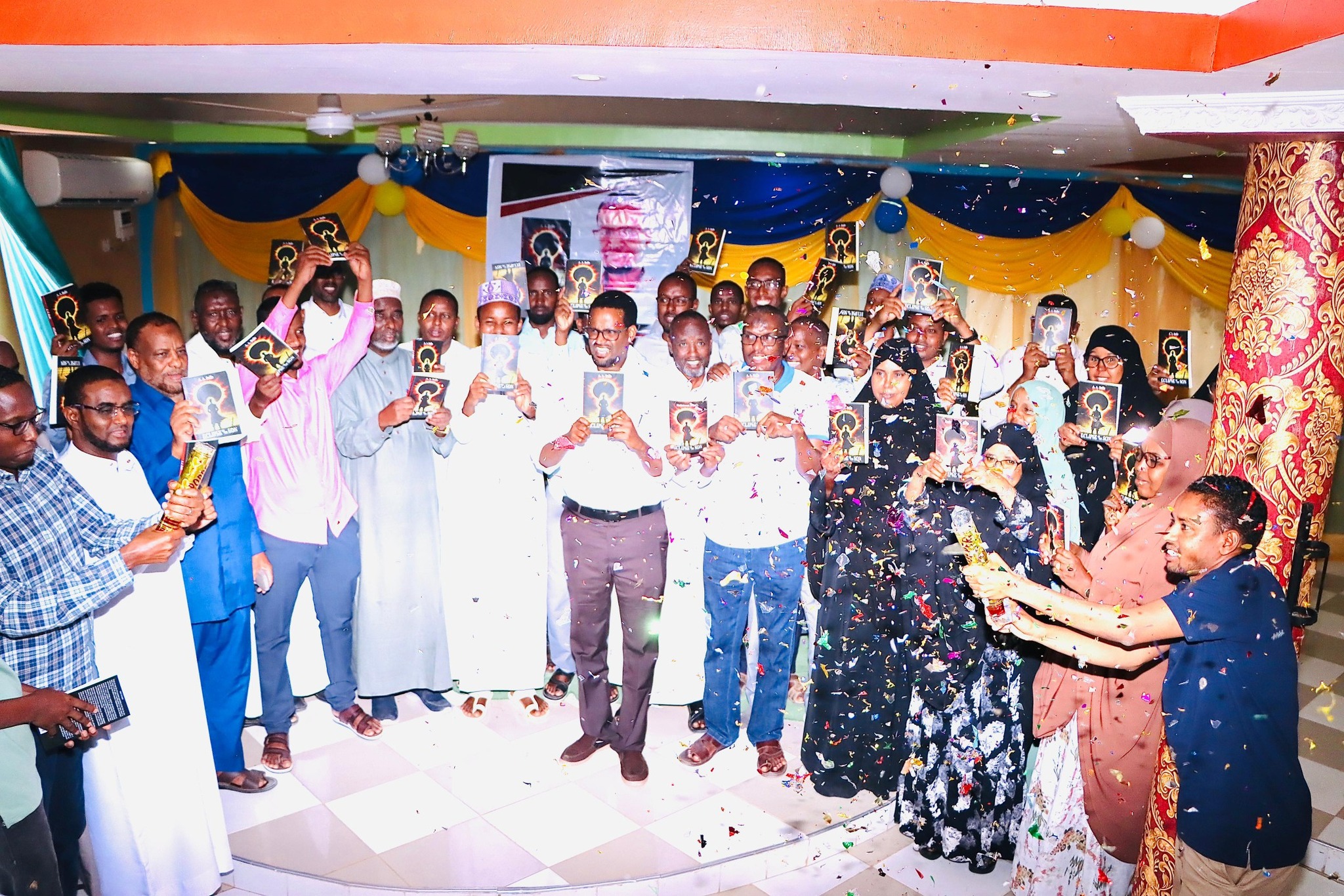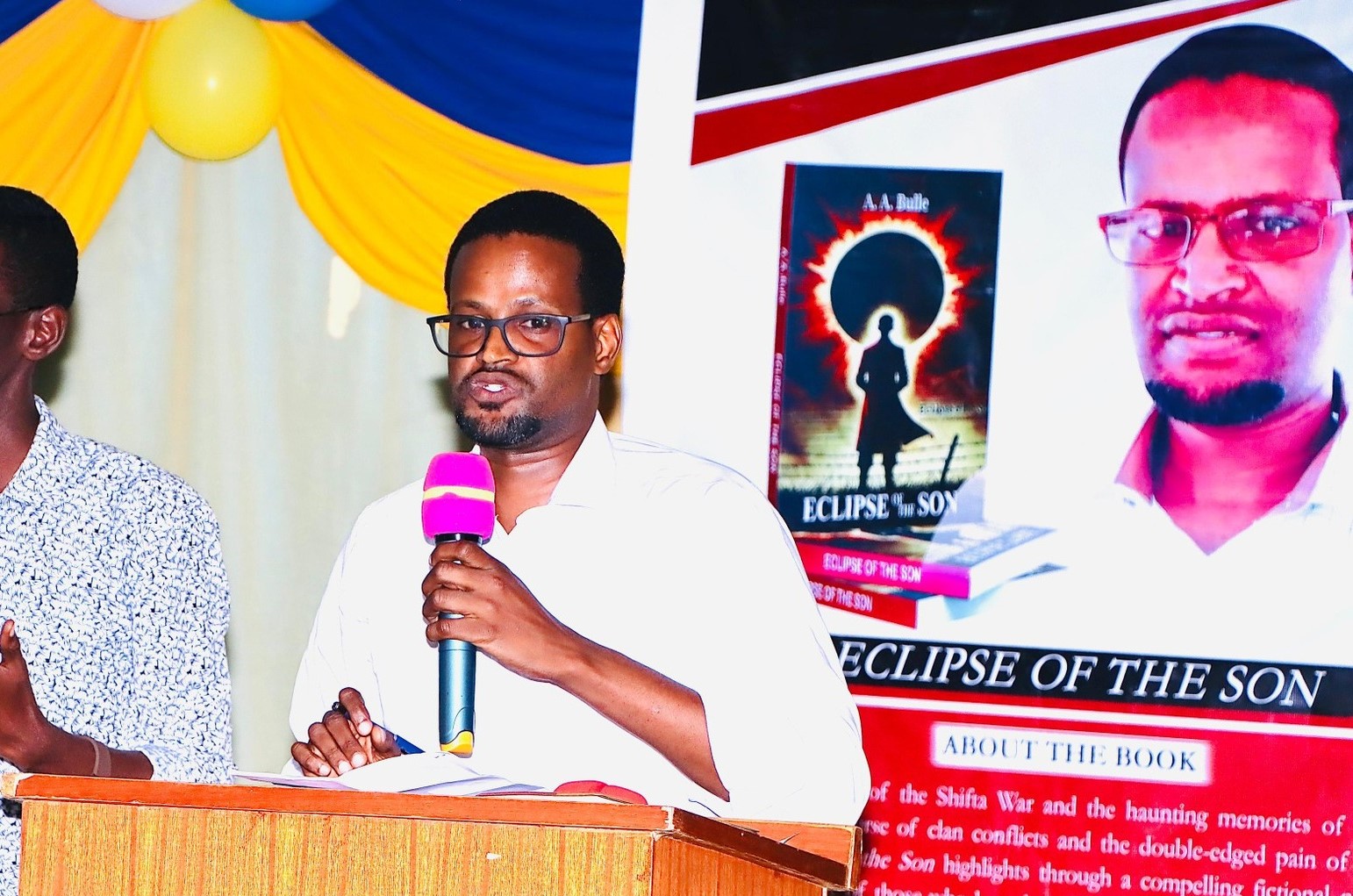
By Abdullahi Jamaa | Wajir Today
Deemed as raw and ruthless revelation of a long history of marginalization, underdevelopment and poor governance, the launch of the new book “Eclipse of the Son” in Wajir town on Sunday revisited the hard scrabbling living standards of the overwhelming majority of residents.
The fiction, is the artwork of Mr. Abdirahman A Bulle, a development practitioner who combines a powerful ingenuity and storytelling technique to highlight the struggle and vexation of five successive generations of men from the same family.
In this book Mr. Bulle recounts how generations in this part of the world spent their life enduring under a boring cosmos of unabated insecurity, oppression and suppression, that almost put every facet of life into a near halt.
During the colorful ceremony, participants drawn from various sectors of the community were treated into a glimpse of the troubled past of a region that has never known any respite from decades of underdevelopment.
With focus on relentless maginalisation, bad governance and insecurity, the books retales how the predominantly nomadic community has been surviving on the edge for decades while still groaning underweight of perpetual underdevelopment.
Starting with the infamous shift war of between 1963-1967, readers are given an engaging perspective of how local communities braved the harsh realities of living in a contested region, underpinned by political advances from both Kenya and Somalia.
Speakers during the event spoke vibrantly about the long and unforgettable past that shaped the resilience of the beleaguered residents, who for decades lived under the darkness of oppressive regimes.
“The book is describing the effects of conflicts in our society. We had the Shifta wars of 1960s when the region was trying to join Somalia and the government of Kenya was resistant about it” says Abdi Billow, a peace and conflict expert
Those days memories of peace were distant echoes for a region steeped in endless insecurity and survival. Residents were on the fault lines of increased border struggle that affected and disrupted every aspect of their life.
The near absence of government services hindered development. The Kenyan government deployed troops to quell anti-government sentiments that often-orchestrated brutality against the marginalized citizens.
It was kind of survival of the fittest for many citizens until the end of the war when Muhammad Haji Ibrahim Egal, Prime Minister of the Somali Republic, signed a ceasefire with Kenya at the Arusha Conference on 23 October 1967.
Systematic marginalisation continued with every successive Kenyan government that saw the region as a buffer zone. Residents were suppressed through state orchestrated policies that not only undermined progress but often resulted in vicious security operations.
The book highlights the impact of the infamous Wagalla Massacre of 1984 where thousands of ethnic Somalis were rounded in a government security operation, resulting in death, injuries and destruction of livestock.
“There are painful experiences in relation to Wagalla Massacre with systematic human rights violations. The book is preserving the raw narrative about human rights violations and atrocities that happened in wajir” says Hassan Abdi Omar, a human rights activist
Persistent human rights violations in various forms, including undermining access to essential and basic services such as education, health and water resulted hopelessness among the troubled residents.
“For far too long this part of the country suffered discrimination, marginalizing and suppression” Says Hashim Elmoge an advocate “We have witnessed decades of human rights violations”
Every conflict pattern in the region gave birth to an endless cycle of insecurity that hindered progressive development. State marginalization gave birth to widespread degeneration and scarcity of resources that often resulted a new wave of insecurity.
In the early 1990s Wajir was at the epicenter of clan clashes that resulted in untold suffering, stagnating efforts to jumpstart meaningful progress. Like the shift war, residents lived in the shadow of fear.
“These conflicts have really marginalized us, that is why up to now we are lagging behind in all facets of development” notes Mr. Abdi Billow
Negotiated democracy

With historical suffering still fresh in the minds and hearts of the local people, a new form of self-marginalization is now appearing to be a growing concern. With corruption, poor leadership and gaps in governance, the future of Wajir as a county hang precariously in the balance.
As the book analyses, poor leadership resulting from negotiated democracy, haunts the aspirations and hopes for Wajir people. Widespread bad governance that lacks transparency and accountability is putting all efforts for sustainable development into disarray.
“We have a very big challenge when it comes to governance. We do elections after every five years but the result is the same. We need to change our governance system” observes Halima Kahiye, the Manager of Wajir Community Radio
Sadly, with all the devolution goodies, there is still an open co-existence of widespread poverty, unemployment, inequality and poor service delivery. Wajir and the rest of the counties in the region are not closing the gaps in development milestones any time soon.
“The biggest human rights issue currently is unequal distribution of resources. In this age an era we still have people who have no access to water, education and health. The book has given us a platform to interrogate our leadership. How do we do the right things” asks Mr. Hassan
With lack of political goodwill exacerbated by a noxious amalgamation of incompetency, unaccountability and vainglory the future looks bleak. These loathsome features of local leadership dynamics slow down access to quality education, health, water and good living standards for the overwhelming majority of our people.
“The manner in which we elect ourselves and the way we manage our resources, we have marginalized ourselves” says Elmoge the advocate “We are the ones to write our next chapter. This is history is important because it motivates. The question is, are we willing to correct our wrongs”
Elders like Jelle Abdi Ibrahim are worried about the future of the county if the poor pollical landscape and governance structures are not addressed on time to chart a new roadmap for progressive development.
“We are always talking of marginalization. We also continue to marginalize ourselves. This is a serious issue. The young generation should replace the tribalists and clan chauvinists. says Sir Jelle “Let’s take steps to educate our people so that we stop complaining about marginalization. Let’s forget about this clannism and focus on performance”
The book, the first of its kind in the region, offers a rare introspection into a haunting history while offering an opportunity to address the agelong ills looming large in the eyes of listless residents.
“It reminds us of many things. Even now, we are not free from marginalization. We are learning that, what we went through was not right, and that we need to reflect and think about our future,” says Wajir High School Principal, Aden Kassim.

